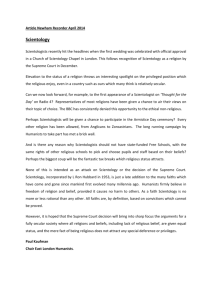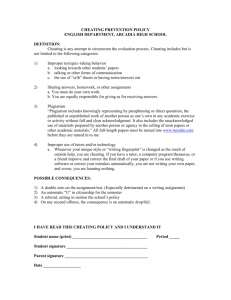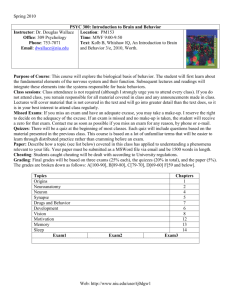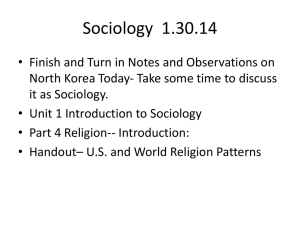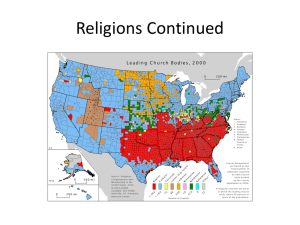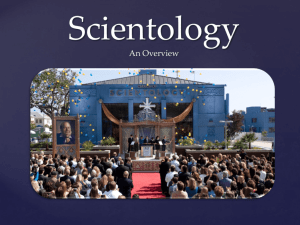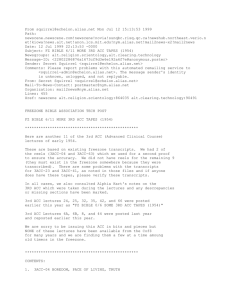explained
advertisement
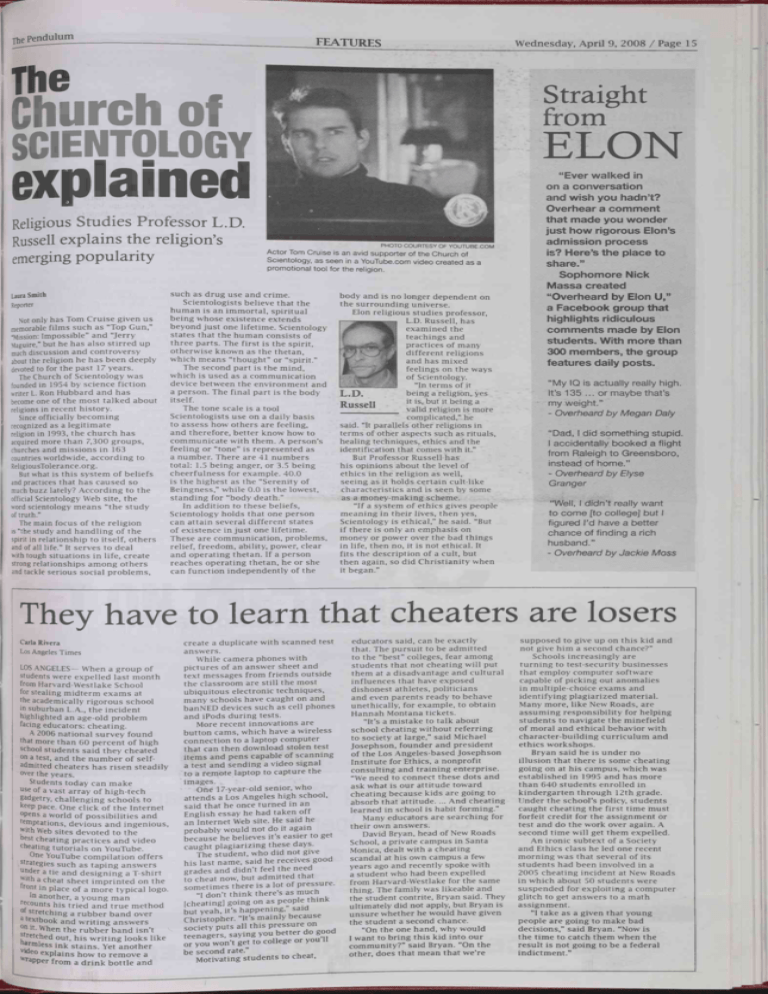
Xhe Pendulum FEATURES The ^ ^ Church o f SCIENTOLOGY Straight from ELON explained Religious Studies Professor L.D. Russell explains the religion’s Laura Sm ith Reporter Not only has Tom Cruise given us memorable films such as “Top Gun,” “Mission: Impossible” and “Jerry Maguire,” but he has also stirred up much discussion and controversy about the religion he has been deeply devoted to for the past 17 years. The Church of Scientology was founded in 1954 by science fiction writer L. Ron Hubbard and has become one of the most talked about religions in recent history. Since officially becoming recognized as a legitimate religion in 1993, the church has acquired more than 7,300 groups, churches and missions in 163 countries worldwide, according to ReligiousTolerance.org. But what is th is system of b e lie fs and practices that h a s c a u s e d so much buzz lately? According to th e official Scientology Web site, the word Scientology m e a n s “the s tu d y of truth.” The main focus of the religion is “the study and handling of the spirit in relationship to itself, others and of all life.” It serves to deal with tough situations in life, create strong relationships am ong others and tackle serious social problems. PHOTO COURTESY OF YOUTUBE.COM Actor Tom Cruise is an avid supporter of the Church of Scientology, as seen in a YouTube.com video created as a promotional tool for the religion. emerging popularity Wednesday, April 9, 2008 / Page 15 such as drug use and crime. Scientologists believe that the h um an is an immortal, spiritual being whose existence extends beyond ju st one lifetime. Scientology states that the hum an consists of three parts. The first is the spirit, otherwise known as the thetan, which m eans “th o u g h t” or “spirit." The second part is the mind, which is used as a communication device between the environm ent and a person. The final part is the body itself. The tone scale is a tool Scientologists use on a daily basis to assess how others are feeling, and therefore, better know how to communicate with them. A person’s feeling or “tone” is represented as a number. There are 41 num bers total; 1.5 being anger, or 3.5 being cheerfulness for example. 40.0 is the highest as the “Serenity of Beingness,” while 0.0 is the lowest, standing for “body death.” In addition to these beliefs, Scientology holds that one person can attain several different states of existence in ju st one lifetime. These are communication, problems, relief, freedom, ability, power, clear and operating thetan. If a person reaches operating thetan, he or she can function independently of the body and is no longer dependent on the surrounding universe. Elon religious studies professor, L.D. Russell, has examined the teachings and practices of many different religions and has mixed feelings on the ways of Scientology. “In terms of it being a religion, yes L.D. it is, but it being a Russell valid religion is more complicated,” he said. “It parallels other religions in terms of other aspects such as rituals, healing techniques, ethics and the identification that comes with it.” But Professor Russell has his opinions about the level of ethics in the religion as well, seeing as it holds certain cult-like characteristics and is seen by some as a money-making scheme. “If a system of ethics gives people m eaning in their lives, then yes, Scientology is ethical,” he said. “But if there is only an em phasis on money or power over the bad things in life, then no, it is not ethical. It fits the description of a cult, but then again, so did Christianity when it began.” “Ever walked in on a conversation and wish you hadn’t? Overhear a comment that made you wonder just how rigorous Eton’s admission process is? Here’s the place to share.” Sophomore Nick Massa created “Overheard by Elon U,” a Facebook group that highlights ridiculous comments made by Elon students. With more than 300 members, the group features daily posts. “My IQ is actually really high. It’s 135 ... or maybe that’s my weight.” - Overheard by Megan Daly “Dad, I did something stupid. I accidentally booked a flight from Raleigh to Greensboro, instead of home.” - Overheard by Elyse Granger "Well, I didn’t really want to come [to college] but I figured I’d have a better chance of finding a rich husband.” - Overheard by Jackie Moss They have to learn that cheaters are losers Carla Rivera Los Angeles T im es LOS ANGELES— When a group of students were expelled last m onth from Harvard-Westlake School for stealing m idterm exam s at the academically rigorous school in suburban L.A., the incident highlighted an age-old problem facing educators: cheating. A 2006 national survey found that more than 60 percent of high school students said they cheated on a test, and the n u m b e r of self­ admitted cheaters has risen steadily over the years. Students today can make use of a vast array of high-tech pdgetry, challenging schools to Keep pace. One click of the Internet opens a world of possibilities and temptations, devious and ingenious, with Web sites devoted to the oest cheating practices and video cheating tutorials on YouTube. One YouTube compilation offers strategies such as taping answ ers under a tie and designing a T-shirt With a cheat sheet im printed on the font in place of a more typical logo. •n another, a young m an recounts his tried and tru e m ethod ° stretching a ru b b e r band over extbook and writing answ ers It. When the ru b b er b a n d isn ’t ^ retched out, his w riting looks like ^srmless ink stains. Yet another ' explains how to remove a f^pper from a d rin k bottle and create a duplicate with scanned test answers. While camera phones with pictures of an answer sheet and text messages from friends outside the classroom are still the most ubiquitous electronic techniques, m any schools have caught on and banNED devices such as cell phones and iPods during tests. More recent innovations are button cams, which have a wireless connection to a laptop computer that can then download stolen test items and pens capable of scanning a test and sending a video signal to a remote laptop to capture the images. One 17-year-old senior, who attends a Los Angeles high school, said that he once turned in an English essay he had taken off an Internet Web site. He said he probably would not do it again because he believes it s easier to get caught plagiarizing these days. The student, who did not give his last name, said he receives good grades and didn’t feel the need to cheat now, but admitted that sometimes there is a lot of pressure. “I don’t think there’s as much [ch eating ] g o in g on as p e o p le thin but yeah, it’s h a p p e n m g , said C h ris to p h e r. “It’s mainly because society p u ts all this p r e s s u r e on te e n a g e rs , s a y in g you better do g oo d or you won’t g et to college or you 11 be second rate.” Motivating students to cheat. educators said, can be exactly that. The pursuit to be admitted to the "best” colleges, fear among students that not cheating will put them at a disadvantage and cultural influences that have exposed dishonest athletes, politicians and even parents ready to behave unethically, for example, to obtain Hannah Montana tickets. “It’s a mistake to talk about school cheating without referring to society at large,” said Michael Josephson, founder and president of the Los Angeles-based Josephson Institute for Ethics, a nonprofit consulting and training enterprise. “We need to connect these dots and ask what is our attitude toward cheating because kids are going to absorb that a ttitu d e .... And cheating learned in school is habit forming.” Many educators are searching for their own answers. David Bryan, head of New Roads School, a private campus in Santa Monica, dealt with a cheating scandal at his own campus a few years ago and recently spoke with a student who had been expelled from Harvard-Westlake for the same thing. The family was likeable and the student contrite, Bryan said. They ultimately did not apply, but Bryan is unsure whether he would have given the student a second chance. “On the one hand, why would I want to bring this kid into our community?” said Bryan. “On the other, does that m ean that we’re supposed to give up on this kid and not give him a second chance?" Schools increasingly are tu rn in g to test-security businesses that employ computer software capable of picking out anomalies in multiple-choice exams and identifying plagiarized material. Many more, like New Roads, are assum ing responsibility for helping students to navigate the minefield of moral and ethical behavior with character-building curriculum and ethics workshops. Bryan said he is under no illusion that there is some cheating going on at his campus, which was established in 1995 and has more th a n 640 students enrolled in kindergarten thro u g h 12th grade. Under the school’s policy, students caught cheating the first time m ust forfeit credit for the assignm ent or test and do the work over again. A second time will get them expelled. An ironic subtext of a Society and Ethics class he led one recent m orning was that several of its students had been involved in a 2005 cheating incident at New Roads in which about 50 students were suspended for exploiting a computer glitch to get answ ers to a m ath assignment. “I take as a given that young people are going to make bad decisions,” said Bryan. “Now is the time to catch them when the result is not going to be a federal indictm ent.”
